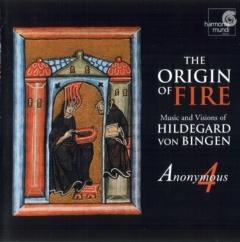Hildegard von Bingen - The Origin of Fire [2004]
Hildegard von Bingen - The Origin of Fire (Anonymous 4) [2004]

01. Hymn: Veni creator spiritus 02. Sequence: Veni spiritus eternorum 03. Antiphon: O quam mirabilis est 04. Vision 1: The fire of creation I - Et ego homo 05. Vision 1: The fire of creation II - Et audivi 06. Sequence: O ignis spiritus paracliti 07. Vision 2: Wisdom and her sisters I - Vidi etiam 08. Vision 2: Wisdom and her sisters II - Prima autem 09. Responsory: O felix anima 10. Vision 3: The fiery spirit I - Iterumque vocem 11. Vision 3: The fiery spirit II - Et imago 12. Hymn: O ignee spiritus 13. Vision 4: Love I - In vera 14. Vision 4: Love II - Et audivi vocem 15. Antiphon: Caritas habundat in omnia 16. Antiphon: O eterne deus 17. Hymn: Beata nobis gaudia Anonymous 4 (Ensemble)
There is a large period between the fall of Rome and the late Middle Ages from which the names of artists, musicians and many other thinkers of note are lost to us. Thus it is of great interest when we have works that can be ascribed to a particular personality, and of further interest when that individual's history is well documented. Such is the case with Hildegard of Bingen, a 12th century German abbess who wrote extensively on medicine and natural history, counseled kings, popes, and emperors, composed music, and had visions.
The Origin of Fire combines four of Hildegard's works with excerpts from her visionary texts set to what Susan Hellauer, in her notes on the program, calls "recitation tones" -- invitatory tones from the service of Matins and festive lection tones, settings from the Mass and Divine Office, the program begun and ended with two Pentecost hymns, Veni creator spiritus and Beata nobis gaudia. Fire, to Hildegard, was emblematic of the Holy Spirit. Fire and light, for that matter, were major images in her visions (which have led some to believe that she may have suffered from migraine, the "heavenly light" of her visions being interpreted as pre-migraine aura.) Whatever their origin (and the visions don't really require an explanation), the total effect is one of a deeply transcendant experience, with an undeniable reality that somehow defies adequate description.
To anyone with more than a passing acquaintance with medieval chant and plainsong of the Gregorian variety or later, Hildegard's music is striking. She was not a trained musician and claimed that she received her compositions whole, words and music together. Whatever the source, they are identifiably different from most other examples of the period. The key seems to be the texts, which are flowing and vivid; there is nothing radical about the melodies themselves, but the perfect melding of the two elements gives a strong sense of these works having been through composed, providing a deep unity both within and throughout.
What is remarkable about this recording, aside from the obvious talent and sensitivity of the performers, is the erudition of their approach, as evidenced by their discussion in the accompanying booklet of Hildegard and the music performed, and its complete transparency in the performance. (There is even a note on the way medieval Latin was pronounced in Germany.) For the most part, the works are monophonic plainsong; those instances where the performers have introduced polyphony are all the more striking set against this spare texture. The final experience is seamless and extraordinarily beautiful, deeply peaceful but showing a quiet intensity that captures the listener's attention. (The booklet is up to Harmonia Mundi's usual standard: substantial, with texts and essays in English, French and German, and beautifully illustrated with images from Hildegard's "Scivias" from a facsimile of the Codex Rupertsberg.)
Anonymous 4 (Marsha Genensky, Susan Hellauer, Jacqueline Horner, and Johanna Maria Rose) are, as much as anyone and more than most, responsible for bringing Hildegard of Bingen to the awareness of a modern audience. Origin of Fire, regrettably, marks their last recording, at least for the foreseeable future: after a career spanning slightly more than a decade and a series of recordings spanning a millenium, the group is taking a break. One can only hope that the break will be brief. --- Robert M. Tilendis, greenmanreview.com
download: uploaded anonfiles mega 4shared mixturecloud yandex mediafire ziddu
Zmieniony (Niedziela, 23 Czerwiec 2013 11:40)








